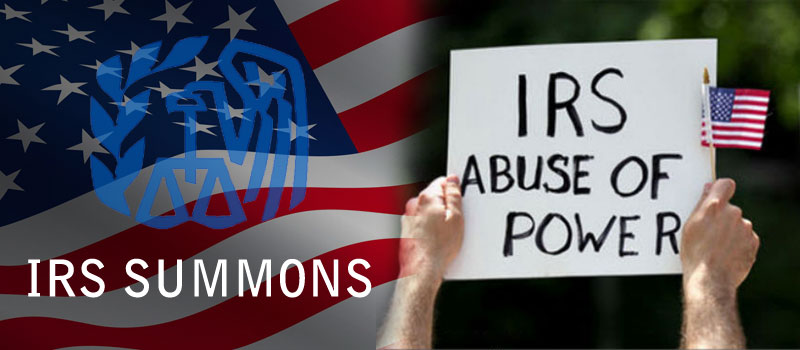By: Coleman Jackson, Esq.
May 22, 2014
The IRS’ authority to summons records from taxpayers and third parties is codified in 26 U.S.C. 7602, which permits the IRS to summon any record that may be relevant or material to a legitimate tax inquiry. The IRS may summon information for the legitimate purpose of ascertaining the correctness of a tax return or determining tax liability. A summons issued for any other purpose is not valid. The IRS cannot go off on a fishing expedition, rifling through a taxpayer or third parties records.
Abuse of process is a very flexible boundary and is not limited to harassment of the taxpayer, or pressuring the taxpayer to settle collateral disputes with the government, or for political, social, economical, or for any other purpose casting doubt on the good faith of the IRS in a particular investigation. The 5th Circuit Court of Appeals has established that an IRS summons may be quashed where enforcement would otherwise constitute an abuse of the court’s process.
Four things to know if you receive an IRS summons:
IRS MUST EXERCISE ‘GOOD FAITH’: The Powell Rule-
- The IRS must establish that the issuance of the summons was for a legitimate purpose. That is, it is issued to determine the correctness of a tax return or determining the taxpayer’s liability.
- The IRS seeks information relevant to that purpose. Relevancy as it relates to IRS summons merely mean that the information sought is even slightly, or tangentially, or remotely possibly germane to the IRS investigation, without any reference to whether it would be admissible in a court;
- The IRS seeks information that is not already in its possession; and
- The IRS has complied with all the required prerequisites established in the U.S. Code.
These four rules were established by the U.S. Supreme Court in 1964 in a tax case otherwise known as, United States v. Powell, 379 U.S. 48, 85 S.Ct. 248, 254-55.
So if you receive an IRS summons, first check to see whether the Powell requirements have been met. If you suspect that the IRS has exceeded its ‘power’; challenge it under Powell in federal court.
But one thing you must know when pushing back with Powell: The IRS burden is slight (like a valley) and the taxpayer’s burden is steep (like a mountain). The burden begins with the IRS but it will quickly shift to the taxpayer- so be prepared to push on the four legs of Powell.
When challenging an IRS summons, the taxpayer must challenge whether the IRS is acting in good faith by pulling on the four legs of the Powell rule.
This blog is written by the Immigration & Tax Law Firm of Coleman Jackson, P.C. It is for informational and educational purposes and does not create an attorney-client relationship between this law firm and the reader. If you have questions about your particular situation regarding levies, summons or any other tax matter you should consult with independent legal counsel with respect to your individual situation or circumstances.
Coleman Jackson, PC
Immigration & Tax Law Firm
6060 North Central Expressway
Suite 443
Dallas, Texas 75206
Law Firm Site: www.cjacksonlaw.com
Main Line: 214-599-0431 ||| Spanish Line: 214-599-0432

